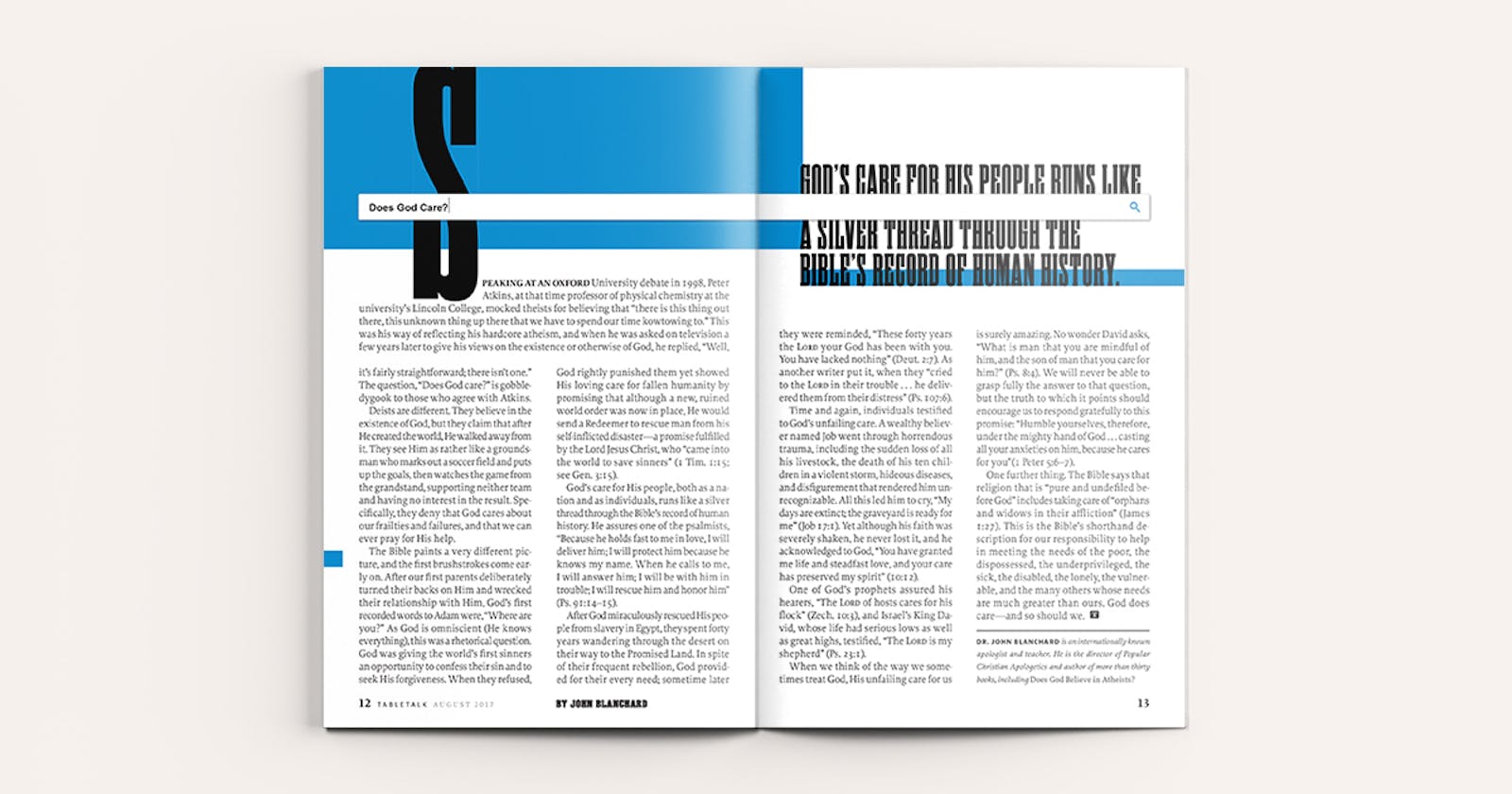
Request your free, three-month trial to Tabletalk magazine. You’ll receive the print issue monthly and gain immediate digital access to decades of archives. This trial is risk-free. No credit card required.
Try Tabletalk NowAlready receive Tabletalk magazine every month?
Verify your email address to gain unlimited access.
Speaking at an Oxford University debate in 1998, Peter Atkins, at that time professor of physical chemistry at the university’s Lincoln College, mocked theists for believing that “there is this thing out there, this unknown thing up there that we have to spend our time kowtowing to.” This was his way of reflecting his hardcore atheism, and when he was asked on television a few years later to give his views on the existence or otherwise of God, he replied, “Well, it’s fairly straightforward; there isn’t one.” The question, “Does God care?” is gobbledygook to those who agree with Atkins.
Deists are different. They believe in the existence of God, but they claim that after He created the world, He walked away from it. They see Him as rather like a groundsman who marks out a soccer field and puts up the goals, then watches the game from the grandstand, supporting neither team and having no interest in the result. Specifically, they deny that God cares about our frailties and failures, and that we can ever pray for His help.
The Bible paints a very different picture, and the first brushstrokes come early on. After our first parents deliberately turned their backs on Him and wrecked their relationship with Him, God’s first recorded words to Adam were, “Where are you?” As God is omniscient (He knows everything), this was a rhetorical question. God was giving the world’s first sinners an opportunity to confess their sin and to seek His forgiveness. When they refused, God rightly punished them yet showed His loving care for fallen humanity by promising that although a new, ruined world order was now in place, He would send a Redeemer to rescue man from his self-inflicted disaster—a promise fulfilled by the Lord Jesus Christ, who “came into the world to save sinners” (1 Tim. 1:15; see Gen. 3:15).
God’s care for His people, both as a nation and as individuals, runs like a silver thread through the Bible’s record of human history. He assures one of the psalmists, “Because he holds fast to me in love, I will deliver him; I will protect him because he knows my name. When he calls to me, I will answer him; I will be with him in trouble; I will rescue him and honor him” (Ps. 91:14–15).
After God miraculously rescued His people from slavery in Egypt, they spent forty years wandering through the desert on their way to the Promised Land. In spite of their frequent rebellion, God provided for their every need; sometime later they were reminded, “These forty years the Lord your God has been with you. You have lacked nothing” (Deut. 2:7). As another writer put it, when they “cried to the Lord in their trouble . . . he delivered them from their distress” (Ps. 107:6).

Time and again, individuals testified to God’s unfailing care. A wealthy believer named Job went through horrendous trauma, including the sudden loss of all his livestock, the death of his ten children in a violent storm, hideous diseases, and disfigurement that rendered him unrecognizable. All this led him to cry, “My days are extinct; the graveyard is ready for me” (Job 17:1). Yet although his faith was severely shaken, he never lost it, and he acknowledged to God, “You have granted me life and steadfast love, and your care has preserved my spirit” (10:12).
One of God’s prophets assured his hearers, “The Lord of hosts cares for his flock” (Zech. 10:3), and Israel’s King David, whose life had serious lows as well as great highs, testified, “The Lord is my shepherd” (Ps. 23:1).
When we think of the way we sometimes treat God, His unfailing care for us is surely amazing. No wonder David asks, “What is man that you are mindful of him, and the son of man that you care for him?” (Ps. 8:4). We will never be able to grasp fully the answer to that question, but the truth to which it points should encourage us to respond gratefully to this promise: “Humble yourselves, therefore, under the mighty hand of God . . . casting all your anxieties on him, because he cares for you”(1 Peter 5:6–7).
One further thing. The Bible says that religion that is “pure and undefiled before God” includes taking care of “orphans and widows in their affliction” (James 1:27). This is the Bible’s shorthand description for our responsibility to help in meeting the needs of the poor, the dispossessed, the underprivileged, the sick, the disabled, the lonely, the vulnerable, and the many others whose needs are much greater than ours. God does care—and so should we.
